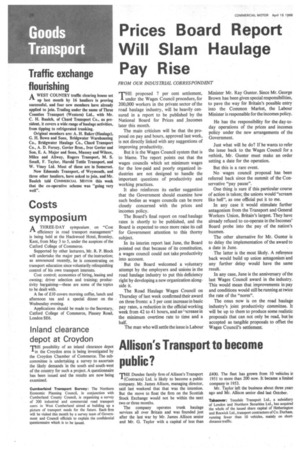Prices Board Report Will Slam Haulage Pay Rise
Page 40

If you've noticed an error in this article please click here to report it so we can fix it.
Fr HE proposed 7 per cent settlement,
under the Wages Council procedure, for 200,000 workers in the private sector of the road haulage industry, will be heavily censured in a report to be published by the National Board for Prices and incomes later this month.
The main criticism will be that the proposal on pay and hours, approved last week, is not directly linked with any suggestions of improving productivity.
But it is the Wages Council system that is to blame. The report points out that the wages councils which set minimum wages for the low-paid and poorly organized industries are not designed to handle the important questions of productivity and working practices.
It also reinforces its earlier suggestion that the Government should examine how such bodies as wages councils can be more closely concerned with the prices and incomes policy.
The Board's final report on road haulage rates is shortly to be published, and the Board is expected to once more raise its call for Government attention to this thorny subject.
In its interim report last June, the Board pointed out that because of its constitution, a wages council could not take productivity into account.
But the Board welcomed a voluntary attempt by the employers and unions in the road haulage industry to put this deficiency right by developing a new organization alongside it.
The Road Haulage Wages Council on Thursday of last week confirmed their award on three fronts: a 3 per cent increase in basic pay rates, a reduction in the official working week from 42 to 41 hours, and an 1crease in the minimum overtime rate to time and a half.
The man who will settle the issue is Labour Minister Mr. Ray Gunter. Since Mr. George Brown has been given special responsibilities, to pave the way for Britain's possible entry into the Common Market, the Labour Minister is responsible for the incomes policy.
He has the responsibility for the day-today operations of the prices and incomes policy under the new arrangements of the Government.
Just what will he do? If he wants to refer the issue back to the Wages Council for a rethink, Mr. Gunter must make an order setting a date for the operation.
But this is a rare event.
No wages council proposal has been referred back since the summit of the Conservative "pay pause".
One thing is sure if this particular course of action is taken; the unions would "scream like hell", as one official put it to me.
In any case it would stimulate further antagonism from the Transport and General Workers Union, Britain's largest. They have already refused to co-operate in the Incomes' Board probe into the pay of the nation's busmen.
The other alternative for Mr. Gunter is to delay the implementation of the award to a date in June.
The latter is the most likely. A reference back would build up union antagonism and any further delay would have the same result.
In any case, June is the anniversary of the last Wages Council award in the industry. This would mean that improvements in pay and conditions would still be running at twice the rate of the "norm".
The onus now is on the road haulage industry's joint productivity committee. It will be up to them to produce some realistic proposals that can not only be read, but be accepted as tangible proposals to offset the Wages Council's settlement








































































































































